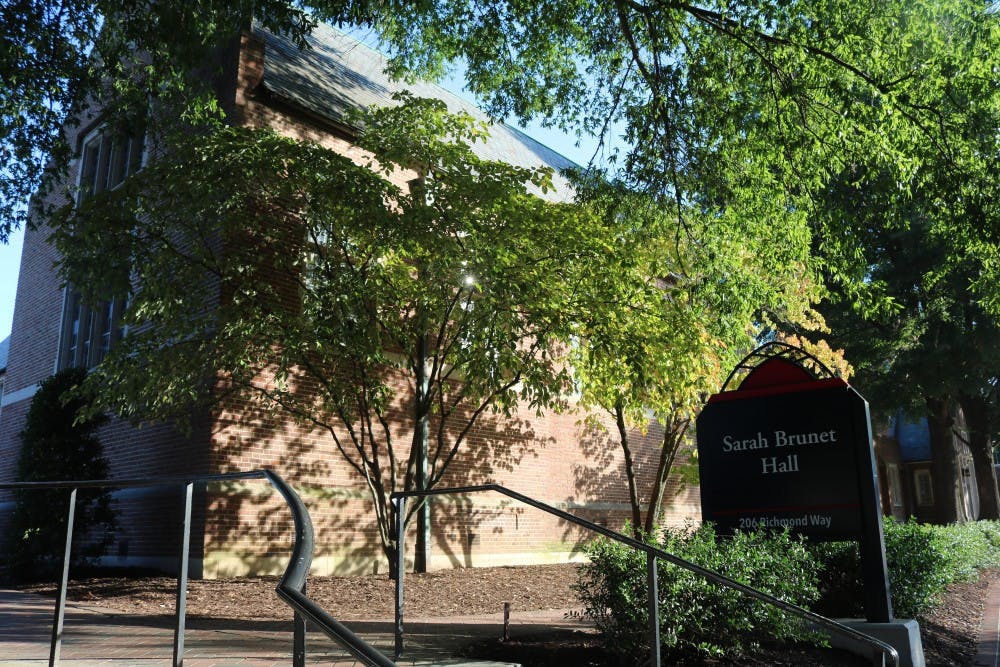Editor's Note: This article is the second in a series exploring mental health and its resources on University of Richmond's campus. The series will continue to be published throughout the fall semester. Click here to read previous articles.
Milo Wilson, Ph.D., a new member of the University of Richmond’s Counseling and Psychological Services staff, wants to help students make meaningful changes in their lives.
Wilson worked in various capacities for the Department of Veterans Affairs for the last seven years, he said. There, Wilson connected veterans to resources within the department as a case manager.
The size of the Department of Veterans Affairs and challenges within the system helped Wilson decide to make a change, he said, and he found the opportunity to work at CAPS.
"I thought it was a great opportunity to make a shift that was good for me and to work with students,” Wilson said. “I really find it exciting and motivating to help people at this stage of life because you're at such a critical time where you are learning and have the opportunity to learn healthy ways of managing your emotions and ways of managing your relationships.
"It's a really unique opportunity and a really critical point in life to be starting to learn some of those things."
In general, Wilson finds that people are uncomfortable with feelings of sadness, guilt and anxiety, he said. Rather than cope with issues, many people push emotions away or stay busy to avoid dealing with long-term problems.
College students tend to be more motivated to seek help and make a change, Wilson said, because issues like anxiety and depression can disrupt success in classes, earning a degree and the direction of a person’s career.
“That's really cool to see folks who tend to be more open to trying new things sometimes,” Wilson said. “Whereas, sometimes folks who have been in patterns of unhealthy emotional habits for long periods of time tend to have a bit more difficulty with changing those and being open to changing those."
At UR, Wilson said “people are more willing to walk in the door.”
Relative to other colleges in the U.S., UR saw a higher percentage of its students using CAPS resources, Wilson said.
His training as a psychologist has been broad, and Wilson worked on accumulating experiences at the VA to build expertise on working with members of the LGBTQ+ community, specifically transgender and non-binary people, he said.
Enjoy what you're reading?
Signup for our newsletter
Wilson completed year-long postdoctoral research on LGBTQ+ mental health and is a passionate member of the LGBTQ+ community, he said.
Wilson said his position as an LGBTQ+ specialist has been welcomed by members of the UR community who have expressed a desire to enhance CAPS services relating to sexuality and gender expression.
“We're seeing both attitudes at UR and in the world changing more rapidly than any other minority group more quickly,” Wilson said. “I think that people are really recognizing that there is a need for having spaces to talk about LGBTQ mental health.
"There's a lot of energy around it both in CAPS and on campus. Hopefully that's a sign for some positive change."
Historically, the mental health field has not had the best relationship with the LGBTQ+ community, Wilson said.
"We know that folks who are LGBTQ-identifying tend to have some higher rates of anxiety, depression and experiences of trauma,” Wilson said. “There are some unique needs within the community, particularly for trans folks and nonbinary folks.
“I really wanted to do work to improve that to create spaces where folks can have an affirming experience to not have to come in and justify their existence as a queer or trans person and to have a positive and affirming experience."
Learning more about the LGBTQ+ community could go a long way in supporting the larger community, Wilson said. As a campus, students, faculty members and staff members can be more aware of how language can affect other people, he said.
Although blatant acts of discrimination against LGBTQ+ people occur, microaggressions – brief, common expressions of prejudice toward any group – tend to happen more often, Wilson said.
“Microaggressions are often called 'Death by 1,000 paper cuts,'" and can have a significant impact on mental health, Wilson said.
“I think that's true whether it's for LGBTQ folks, people of color, people with disabilities, international students ... all of the different diverse communities on campus,” he said.
For LGBTQ+ students, CAPS is a safe and welcoming place where identities can be expressed openly, Wilson said. CAPS can provide a variety of services as long as people are not afraid to come in the door, and is looking to adapt new ways to help LGBTQ+ students, he said.
"We're hoping that some of the things to come will include some support groups,” he said. “I've been working with the LGBTQ+ Coalition to start up a trans and nonbinary support group this semester.”
The creation of a “coming out” support group for students questioning their gender and sexual identities is also a possibility for the fall semester, Wilson said.
Wilson stressed that any member of the UR community can come to CAPS for support. With the stigmas surrounding mental health services decreasing, both for oneself and from other people, people do not need to be afraid to seek support, he said.
“You don’t have to struggle with mental health problems by yourself," Wilson said. "We are here to help.”
Contact news writer Morgan Howland at morgan.howland@richmond.edu.
Support independent student media
You can make a tax-deductible donation by clicking the button below, which takes you to our secure PayPal account. The page is set up to receive contributions in whatever amount you designate. We look forward to using the money we raise to further our mission of providing honest and accurate information to students, faculty, staff, alumni and others in the general public.
Donate Now



